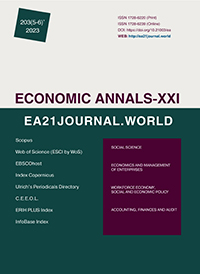Economic analysis of material and technical support of scientific potential of researchers at Kazakhstani universities
Economic analysis of material and technical support of scientific potential of researchers at Kazakhstani universities
Author(s): Anuar Aryngazin, Ansar Aryngazin, Askar Aryngazin, Madina TynybayevaSubject(s): Economy, Economic policy, Higher Education
Published by: Institute of Society Transformation
Keywords: Higher Education Institution; Research Potential; Individual; Personality; Research Methods; Material-Technical Provisioning; Economics; Statistical Analysis; Decision Theory;
Summary/Abstract: One of the pressing challenges confronting higher education institutions in Kazakhstan is the enhancement of the quality of academic and research training for students, particularly at the postgraduate level (PhD). This quality is significantly influenced by the research capabilities of academic faculties. The assessment of academic training involves various factors, including the proficiency level in scientific methodologies exhibited by academic staff and postgraduate students. Economics of material-technical infrastructure plays a pivotal, often decisive role in this training, especially in the realm of natural and technical sciences. The primary goal of our study is to gauge the proficiency levels in scientific methodologies among academic faculty, scrutinize economics of material-technical provisioning of higher education institutions, and to formulate pedagogical and administrative recommendations targeted at the academic staff and management of these institutions. In the presented country case study (Kazakhstan), a comprehensive survey and data collection were carried out, involving 23 higher education institutions, 22 research institutes (spanning the years 2019-2021), and about 800 surveyed academic and research representatives in the fields of humanities, natural-technical sciences, and mathematical disciplines. A pronounced deficiency (82%) was identified in the grasp of scientific methodologies within higher education institutions. Marginal variances were observed between universities and research institutes, as well as between natural-technical and social-humanitarian faculties. Alarmingly lower levels of material-technical provisioning per academic faculty member were revealed, ranging from a mere 2% to 75% compared to research institutes. The presented results introduce new quantitative and qualitative data extracted from primary sources. The analysis uncovers both general and specific per-capita characteristics of the research potential of academic faculty and higher education institutions in Kazakhstan. It reveals significant variances in material-technical provisioning, ranging from a mere 2% to 75% when compared to research institutes. We provide evaluations and recommendations for universities to substantially augment the per-capita characteristics of material-technical provisioning at the level of individual research potential. In the economical aspect, we advise to improve workplace facilities and equipment.
Journal: Економічний часопис - ХХІ
- Issue Year: 203/2023
- Issue No: 5-6
- Page Range: 48-58
- Page Count: 11
- Language: English

